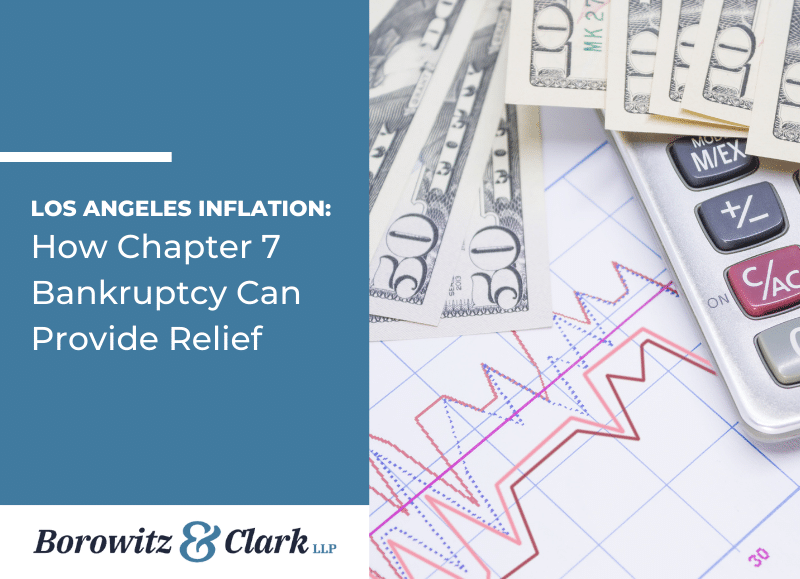
Inflation has slowed significantly since 2022, but prices for most consumer goods continue to climb. The most recent U.S. Consumer Price Index report showed a 3% year-over-year increase, with gas prices climbing even more. In the Los Angeles metro area, inflation is a bit higher than the national average, at about 3.5%.
If you’re trying to make ends meet on the same income you had before inflation struck–or even if you’ve received a small increase that didn’t keep pace with inflation–we don’t have to tell you how hard inflation can hit. Here’s what the most recent Economic Well-Being of U.S. Households report from the Board of Governors of the Federal Reserve revealed:
-
Inflation and prices remain the most commonly-cited concern–especially grocery costs
-
60% of adults said rising prices had made their financial situations worse
-
37% of adults said they couldn’t cover a $400 emergency expense with cash or equivalent
How to Manage Inflation in California
For most people, the first line of defense when something breaks the budget is to look for ways to scale back costs. That’s usually a good first step, but it isn’t always sufficient. That’s especially true when the problem is that necessities such as food and energy have significantly increased in price.
Another option is to increase income. That’s often easier said than done, but some in Los Angeles saw an increase in 2025. The city of Los Angeles raised its minimum wage to $17.87/hour as of July 1, 2025. On the same date, a new minimum wage of $17.81 took effect in Los Angeles County. The city also passed an increased minimum wage–$22.50/hour–for workers at hotels with 60 rooms or more. That measure was temporarily halted by a referendum, but took effect on September 8, 2025. Los Angeles workers also have a slightly higher average wage than the country as a whole. Unfortunately, the higher cost of living in L.A. The most recent data available suggests that the average hourly wage in Los Angeles is about 12.2% higher than the nationwide average, while the local cost of living exceeds the national average by 50%.Don’t Let Your Finances Continue to Worsen
Another option is to increase income, and many have done so in the past year. In Los Angeles, total compensation increased by 5.2% between March of 2021 and March of 2022. Unfortunately, that number is lower than the rate of inflation, meaning Los Angeles workers are still coming out behind. And, of course, not all workers saw an increase in earnings.
If inflation has broken your budget, or if you’re just getting by and have student loan payments, rent increases, and other increased expenses on the horizon, it’s time to explore a more lasting solution than cutting out restaurants and delaying vehicle maintenance.
If you’re making payments on credit cards and other high interest debt, you may have given little thought to those payments before inflation took its toll. Or, maybe you were already juggling those payments with medical debt and other expenses, wondering whether you’d ever pay down those balances. You may even have taken on expensive payday loans to fill the gap when prices started increasing, only to get caught in a cycle of costly re-borrowing.
Could Chapter 7 Bankruptcy Help You Fight Inflation?
Filing bankruptcy won’t lower the cost of consumer goods, but it might help you weather the changes. If you’re servicing high-cost debt like credit card debt, you’re spending money every month on interest. If you’ve fallen behind or are sporadically late, you’re almost certainly paying late fees as well.
For example, if you’re carrying $5,000 in credit card debt at 18% interest and making 3% minimum payments, it will take you about 19 years to pay off that credit card–assuming that you don’t make any purchases or incur any late fees or other charges. About half of the money you pay toward that credit card debt will go to interest.
Obviously, at higher balances and/or higher interest rates, the cost is even greater. If you make payments on the same $5,000 debt at the same minimum payment of 3% but your interest rate is 23.9%, it will take 27 years to pay down that debt, and 65% of your payments will go to interest.

An expert tip from Erik
Discharging that one debt would mean reclaiming $150/month to put toward the family budget, while saving you many years of payments and thousands of dollars in interest. But, most people don’t have just one debt. Depending on your debts and monthly payments, you might be able to save hundreds of dollars each month by wiping the slate clean.
To learn more about whether Chapter 7 bankruptcy could help you absorb increasing Los Angeles prices, schedule a free consultation with one of the experienced bankruptcy attorneys at Borowitz & Clark. Call 877-439-9717 right now. Or, if you prefer, fill out the contact form on this page or click in the lower right-hand corner to chat.
